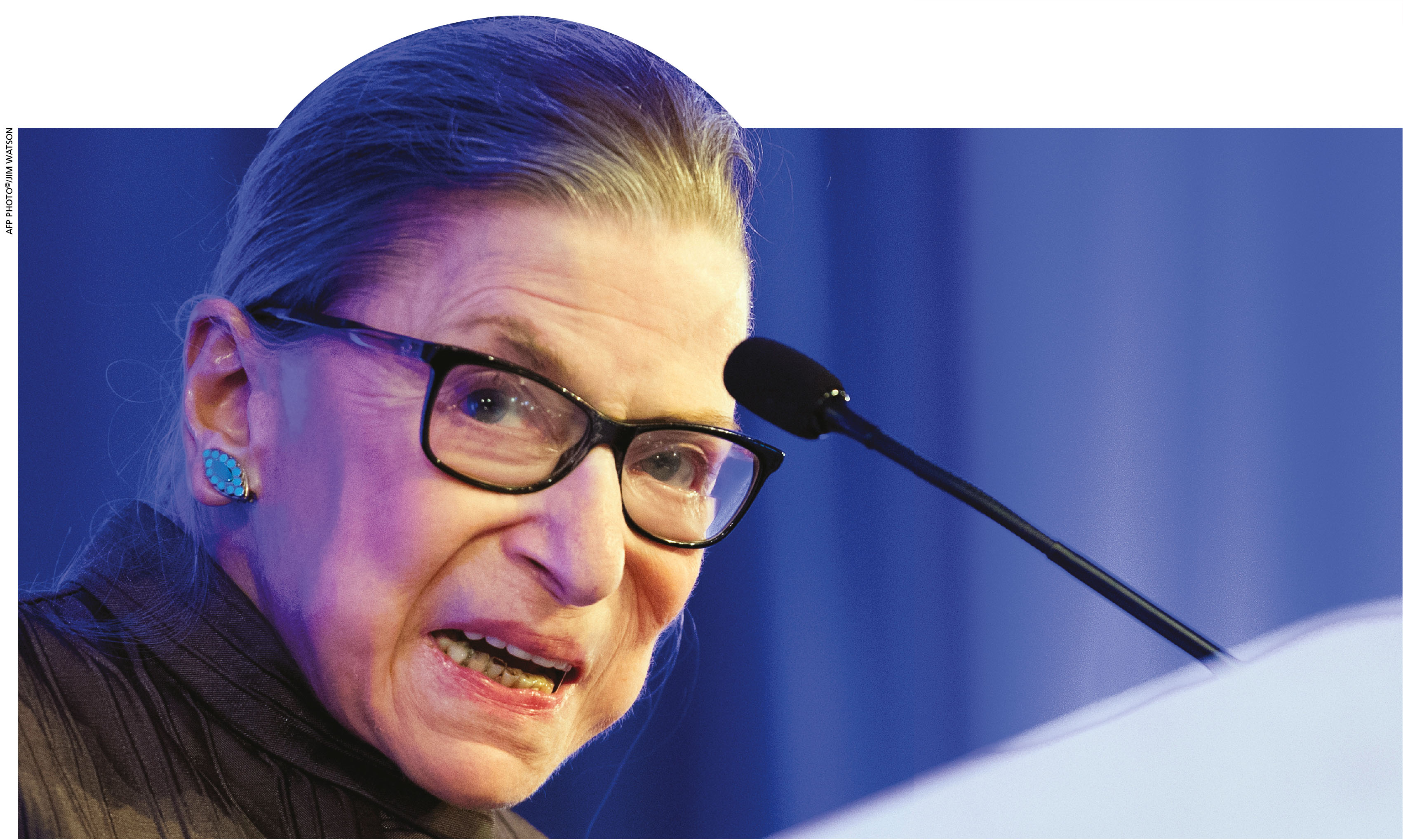US SUPREME COURT
THE COST OF LOSING RBG
Saro Thiruppathy discusses American concerns in the aftermath of Justice Ginsburg’s death
Supreme Court Justice Ruth Bader Ginsburg who fought gender discrimination and fiercely advocated for human rights will always be an American icon. She united the liberal justices in the Supreme Court (SC) and even won over a conservative vote or two in some rights based cases.
She couldn’t have chosen a more contentious time to leave this world after battling a terminal illness for a very long time. And her death at the age of 87 on 18 September has sparked such controversy that previous burning issues such as the Black Lives Matter movement and the COVID-19 crisis were pushed back following her death.
LEGAL ISSUES Concerns among Americans are many and include women’s rights based legislation such as Roe vs Wade, the future of the Affordable Care Act, the rights of Dreamers under the Deferred Action for Childhood Arrivals policy (DACA), the rights of LGBTQ couples etc.
All these cases are at risk of being overturned in the event a conservative judge is appointed to the Supreme Court.
Until 1981 when President Ronald Reagan nominated Justice Sandra Day O’Connor to the SC, all Supreme Court justices had been men. Justice Ginsburg was nominated by President Bill Clinton in 1993 and many years later, President Barack Obama nominated Justices Sonia Sotomayor and Elena Kagan to the SC.
At the time of writing, Justice Amy Coney Barrett has been nominated by President Donald Trump to succeed Ginsburg. Her appointment has to be confirmed by the Senate and Republicans are threatening to seek a simple majority if Democrats try to delay her confirmation. Trump is hoping to have her installed before 3 November when the country elects a president.
SENATE HYPOCRISY The haste with which Senate Republicans are planning to push through Barrett’s confirmation reflects their fears that if a Democratic president is elected, another liberal judge will be appointed to the SC bench.
Their manoeuvres to confirm Barrett’s appointment on the eve of the presidential election are receiving severe criticism from the Democrats because of previous Republican hypocrisy.
In February 2016, Obama tried to nominate Justice Merrick Garland to fill the vacancy created by the death of Justice Antonin Scalia. Senate Majority Leader Mitch McConnell (R) objected even though there were eight months to go before the presidential election in November.
He claimed that any appointment so close to the election by a sitting president would be null and void, and maintained that a new judge should be chosen by the new president.
In the past, some of Trump’s plans were stymied when conservative Chief Justice John Roberts, Jr. voted with the liberal judges. Roberts was nominated in 2005 by President George W. Bush to succeed Justice William Rehnquist.
It seems that judges in the US Supreme Court mostly vote according to party ideology rather than their conscience. However, Chief Justice Roberts’ swing vote has helped temporarily save the Affordable Care Act and DACA, which Trump wants to end.
Previously, Roberts had voted with the four liberal judges (of whom Ginsburg was one) to block the inclusion of a question on citizenship in the 2020 census.
Roberts has displayed an interest in protecting the integrity of the judiciary and often voted with his conscience. Though he voted in 2015 against LGBTQ rights, Roberts stood by the community in 2020 and the Supreme Court declared that marriage equality was constitutionally protected. The SC also held that workers can’t be fired for being gay or transgender.
This historic 6-3 decision was written by Justice Neil Gorsuch, another conservative judge appointed by Trump. Votes of conscience such as these are what have made Republicans desperate to have a conservative judge succeed Ginsburg since both Roberts and Gorsuch have proved they can stray from party ideology.
LIBERAL MINORITY Until Justice Ginsburg’s demise, the SC’s 5-4 tilt had conservative justices in the majority, which stands at 5-3 – and if Trump has his way, it will be 6-3 and a win for right-wing policies.
The Affordable Care Act comes before the court yet again on 10 November and if the case is heard by a 6-3 bench, the verdict could spell disaster for the health cover of millions of Americans.
Even while the landmark ruling on LGBTQ rights favoured the community, there is a fear that another conservative judge on the SC bench could support religious rights and place hard-won LGBTQ victories at risk. Justice Ginsburg had voted in favour of LGBTQ rights and also kept religious sentiments within narrow confines.
The battle over the decision in Roe vs Wade, which protects a pregnant woman’s right to choose to have an abortion without excessive government restrictions, will once again pick up steam and may even result in the 1973 ruling being overturned.
There are many other cases such as climate change and immigration that will also come before the SC after the presidential election. And they could all be doomed if the judges vote according to ideology rather than conscience.
Most important is the litigation that may arise as a result of the presidential election. And in the event of a dispute, a SC packed with conservative judges can be immensely helpful to the Republicans – much like what happened in Bush vs Gore in 2000.







Leave a comment